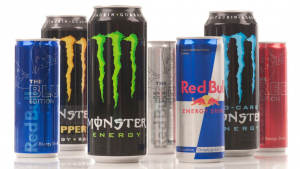
One 250ml can of an energy drink contains around 80mg of caffeine-the equivalent of nearly three dans of cola.Some energy drinks contain exceptionally high levels of sugar-on average they have 60% more calories and 65 % more sugar than other soft drinks.
More than two thirds of 10-17 year olds and a quarter of 6-9 year olds consume energy drinks regularly and so these energy drinks are likely to be contributing to both obesity and tooth decay in children.
The BDA has stated that these drinks are highly acidic,habit forming and can contain a barely believable 20 spoonfuls of sugar-which makes some soft drinks with a mere 8 spoonfuls seem positively healthy!
Caffeine is the most commonly used psychoactive drug across the world because it increases activity and heightens awareness,but it also increases anxiety,causes sleep deprivation and is linked to behavioural problems in children.Some energy drinks contain at least 320 mg/ml of caffeine and this a concern as psychological issues can lead to risky behaviour and poorer academic attainment.
It would be ironic that children taking these energy drinks when participating in sporting activity that should be helping their health can actually be doing themselves harm.
There is therefore sufficient evidence that the sale of these energy drinks to children should be restricted or banned ,and advertising of these products aimed at the young should be stopped.
Adults should also be mindful of their consumption of these energy drinks as they can cause obesity ,dental decay and enamel erosion of particularly upper front incisor teeth causing sensitivity and poor appearance requiring dental treatment.
Water consumption or highly diluted acidic drinks are the recommended drinks when playing sports.



Leave A Comment